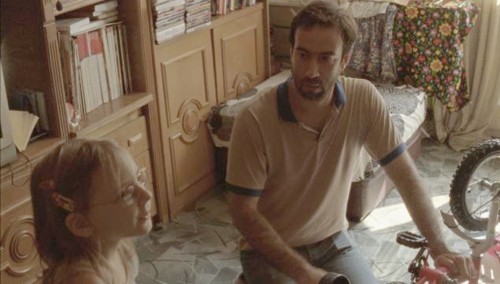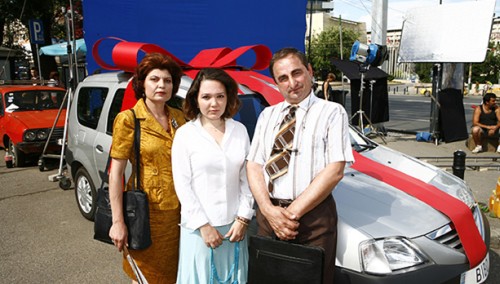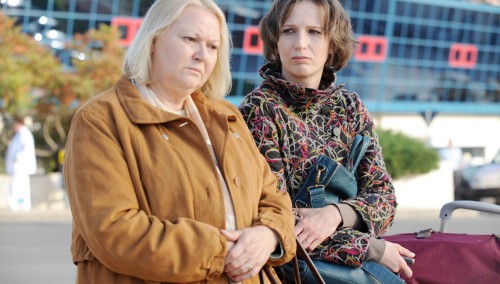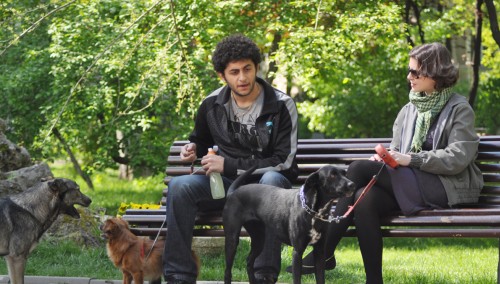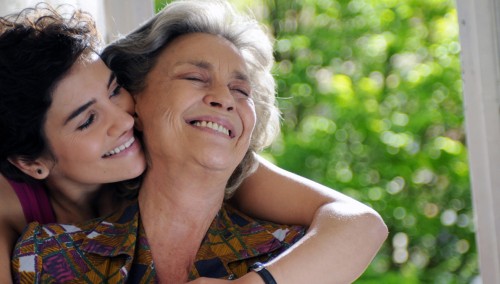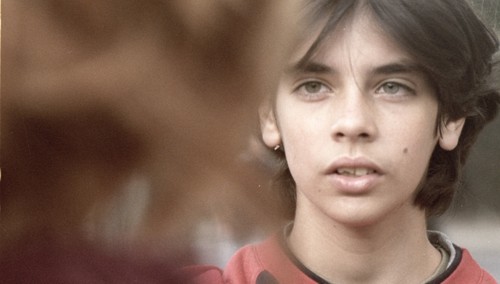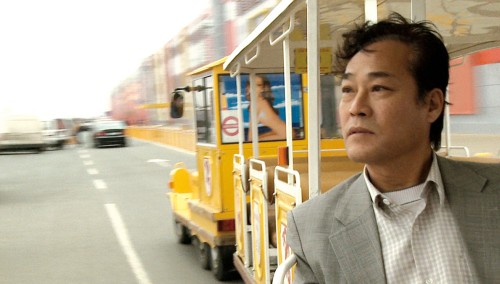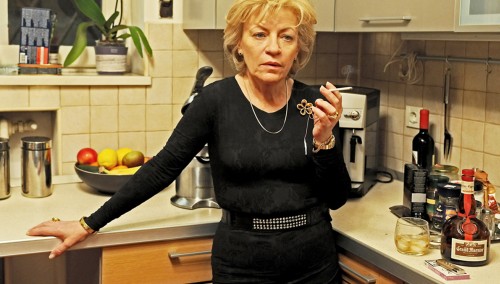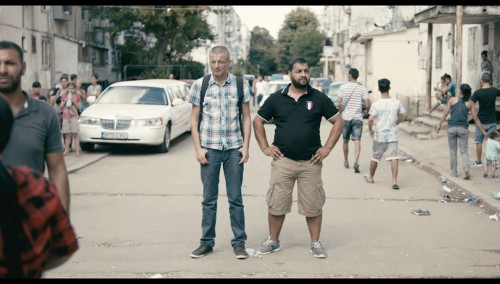Ada Solomon (*1968) from Romania has been working as a producer for over 20 years extremely successfully, and that all over Europe. Her apparently infallible sense of talent has already catalyzed a number of careers. For instance, she has produced the feature film debuts by Radu Jude (Cea mai fericita fata din lume / The Happiest Girl in the World), Melissa de Raaf and Razvan Radulescu (Felicia inainte de toate / First Of All Felicia), and Paul Negoescu (O luna in Thailandia / A Month in Thailand). In addition, she is also known for her versatility, so that short films, feature films AND documentaries are listed in her filmography. Ada Solomon also co-founded the NexT Int. Film Festival Bucharest.
Productions from her companies HiFilm Productions (founded 2004) or Parada Film are invited to the most prestigious festivals in the world, whether it is Berlin, Cannes, Locarno or Venice, and are also distinguished with awards: e.g. Din dragoste cu cele mai bune intentii / Best Intentions (RO, HU, FR 2011; D: Adrian Sitaru) in Locarno, Pozitia Copilului / Child’s Pose (RO 2012; D: Călin Peter Netzer) with the Golden Bear, and Aferim! (RO, GB, CZ 2015; D: Radu Jude) with the Silver Bear at the Berlinale.
At the European Film Awards in 2013, Ada Solomon was awarded the PRIX EURIMAGES – European Co-Production Prize for her “decisive role in the field of European co-productions”. It is therefore hardly surprising that she was also involved as executive producer in one of the prime examples of European co-productions in recent years: TONI ERDMANN (DE, AT, CH, RO 2016; D: Maren Ade). Further ties to Austria in her work are found with Katharina Copony’s documentary film OCEANUL MARE (AT, DE, RO 2009) and the new documentary film by Johannes Holzhausen, THE ROYAL TRAIN (AT, RO 2018).
Films produced by Ada Solomon have already been shown at past editions of CROSSING EUROPE, such as in 2011 the two feature films Principii de viata / Principles of Life (RO 2010; D: Constantin Popescu) and Cea mai fericita fata din lume / The Happiest Girl in the World (RO, NL 2009; D: Radu Jude).
In the SPOTLIGHT section of the coming festival, a presentation of seven feature-length films and a short film program is planned, including two current works (a feature film and a documentary in the competition sections). Ada Solomon will present her productions in Linz in person, and during a Masterclass she will offer insights into her way of working and her wealth of experience as an internationally successful film producer.
What connects us
by Andrei Tănăsescu (filmmaker, festival programmer and curator (RO / CA))
“I consider myself lucky”, is Ada Solomon’s reply when asked to look back on her career. It’s a strikingly humble statement, particularly from one of Romania’s most important producers, an industry leader with an impressive, international palmarès, and a consistent supporter of new cinematic voices. If at first it may read as a response of pragmatic modesty, a thoughtful consideration reveals the core of Ada Solomon’s unique qualities as a producer. Namely, a steadfast commitment to the creative force of cinema, grounded by an industry acumen that has garnered awards, admiration and an enviable filmography. Her response becomes even more telling when one considers the timeline of her career, spanning Romania’s post ’89 film history.
More than anything, Ada Solomon’s career is also an exemplary indicator of the New Romanian Cinema, a testament to artistic prescience, “marketplace” adaptability and the passion for renewal. Facing Romania’s transitional decade of the 1990s as a fresh engineering graduate, Solomon began her apprenticeship into the world of cinema at the independent production company Domino Film. It was a period of re-adjustment for the film industry, and for the next eleven years Solomon would learn every aspect of filmproduction, ranging from production runner to assistant director. At the start of the new millennium and concurrent with the first waves of Romania’s New Cinema, Solomon started HiFilm Productions in 2004. Her first success came two years later, when Radu Jude’s short The Tube With A Hat won the main prize at Sundance. That same year she would release two more films premiering at Oberhausen and Cannes Critics’ Week respectively: Alexandra and Marilena from P7. Her indelible contribution to the premonitory “boom” of the New Romanian Cinema was thus established, along with a production company that would nurture many of the country’s auteurs and raise the bar for Romanian cinema.
One way to understand Solomon’s work is to look at key events that marked her career – which shows no signs of slowing down, balancing auteur productions with career-defining debuts. In 2013 she made history with the first Romanian film to win the Golden Bear in Berlin, Călin Peter Netzer’s incisive drama Child’s Pose. Later that year she was given the Eurimages Co-production Award by the European Film Academy, another first – this time for Eastern Europe. In 2016 she became the first Romanian producer to be nominated for an Oscar (as the executive producer on Toni Erdmann). Earlier this year, Ada Solomon was given the Central European Initiative Award for her “ability to portray the contemporary reality of Europe and dialogue between cultures.” Two awards recognizing her for connecting local stories to an international market; two career-defining films, examining family dynamics, a common thread revealing a profound interest in the universal language of human relationships. As Solomon says herself, “I always choose the person first, not the story.”
Crossing Europe’s spotlight on Ada Solomon reveals this thematic focus through a perceptively curated selection covering fiction and documentary, shorts and feature-length films. The short film selection offers three works that take the New Romanian Cinema’s “slice of life” topos and imbue their sociological portraits with each director’s storytelling sensibilities. Be it Alexandra’s astute observation of domestic (dis)harmony between a recently divorced couple, the exploration of man’s relationship with animals in the urban moralist fable Lord, or Marilena from P7 ’s social-magical realist story of adolescent coming-of-age, these films offer a humanistic perspective on human nature’s short-circuited selflessness.
The fraught relationship between parents and children is explored in two of Ada Solomon’s feature debuts of 2009 (Radu Jude’s The Happiest Girl In The World and First of All, Felicia, co-directed by Melissa de Raaf and Răzvan Rădulescu) and Călin Peter Netzer’s Child’s Pose. Although not one to play favourites when it comes to gender (“an artist is an artist, a filmmaker is a filmmaker”), Solomon has continued to champion women-centered projects, the two debuts being perfect examples. Co-scripted by Augustina Stanciu and Melissa de Raaf, respectively, they both focus on a female protagonist struggling for self-determination, overcoming ordeals and parental confrontations for a modicum of autonomy. With Child’s Pose, the agonizing build-up of inter-familial conflict reaches traumatic proportions of matriarchal pathology and nuanced psychological profundity.
Black Sea (d. Federico Bondi, 2008) and The Big Ocean (d. Katharina Copony, 2009) further explore our connective roots, reaching out across borders and cultures. Although less known than the rest of the curated showcase, the films are important works which show Ada Solomon’s range of co-productions. Tackling themes of identity (its loss and recovery), cross-generational/cultural bonds and labour migration, they put an individual, human face to the global marketplace that surrounds us.
Taken together, these films are proof of Solomon’s interest in exploring the social, cultural and political contexts of each respective story. A global citizen by trade and deeply rooted “local” by birth, Solomon has maintained an active interest in the artistic scene of her native city Bucharest. Coupled with her preoccupation for the crossover between documentary and fiction, the intersection of socio-cultural awareness and hybrid forms of representation has manifested in her more recent films a conscious display of artistic activism. Case in point – Ivana Mladenovic’s queer-roma love story Soldiers. A Story from Ferentari and Alexandru Solomon’s essayistic documentary on mankind’s evolutionary will to power, Tarzan’s Testicles.
In our increasingly polarized climate, it has become essential for art (and by extension, cinema) to be a source of unity and empathy. To quote Ada Solomon, cinema should “raise questions, stir reactions and give the spectator food for thought.” Over the course of her career, Ada Solomon’s dedication to explore the dynamics that govern our relationships to ourselves, society at large and beyond, has played an integral part in the formation and evolution of the New Romanian Cinema. By crossing the border and reaching out internationally, she has strengthened the universal ties that bind us all and carved new paths for us to explore them. We could not be luckier for it.
Masterclass Ada Solomon
28 April, 16:00, OK Deck
Host: Dana Linssen (film critic, NL)


